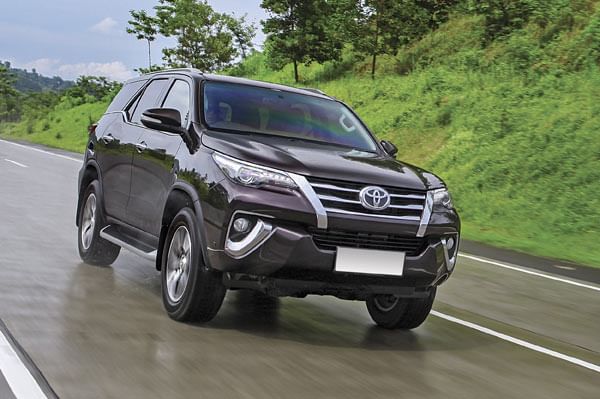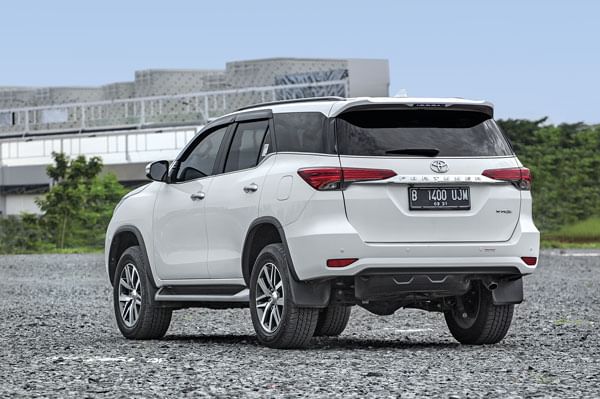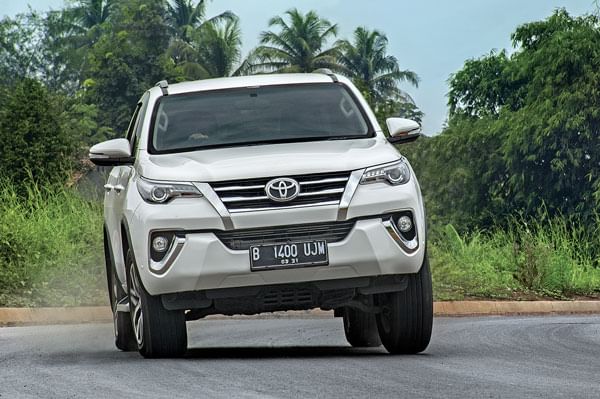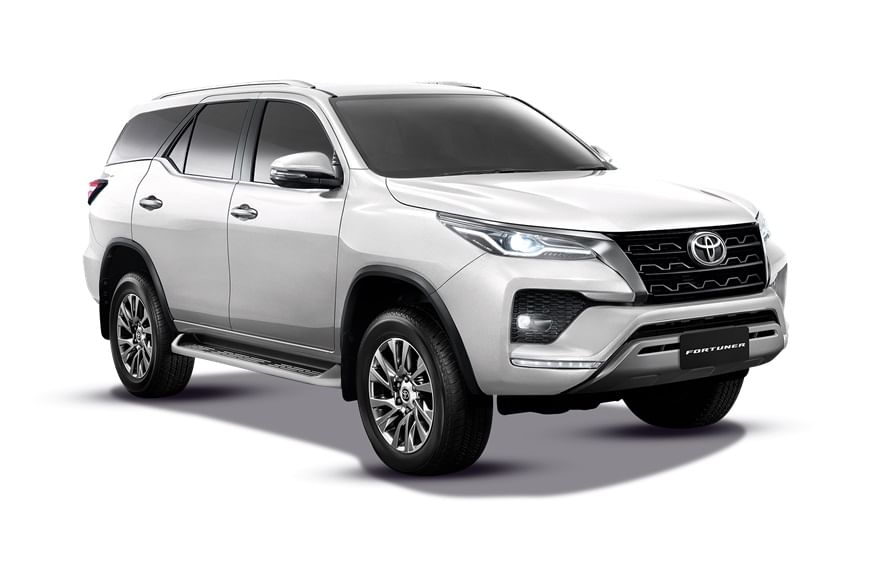New 2016 Toyota Fortuner review, test drive
Toyota’s all-new Fortuner is coming this November to stake its claim as king of its class. We get behind the wheel.
Published on Oct 27, 2016 03:20:00 PM
1,61,064 Views
Follow us on


The Fortuner looks best when viewed from the rear three-quarters.

The ride is much flatter and more settled, and it even feels a bit more agile around corners.
Pay attention, listen carefully and you’ll find that most cars ‘talk’ to you. No, I don’t mean the voice of the lady that calls out directions or the one that reads your short messages to you (when your phone’s hooked up). What I’m on about are the little subliminal messages almost all cars seem to put out. They tell you how comfortable they feel at high speeds, how happy they are bouncing over a poorly surfaced road, or just how much effort they are putting in to deliver performance.
No, you don’t need to drop down into a zen-like state and lower your heartbeat to pick up these messages and, of course, the car doesn’t actually ‘speak’ to you either, but what you do tend to get, if you are really ‘listening’, is loads and loads of information.
Problem is, the ‘information’ I’m currently getting from the new Fortuner is all but unbelievable. I’ve just run it hard across a set of deep ruts, thrown it nonchalantly down a rocky riverbed and even thrashed it across an abandoned construction site; but instead of complaining or threatening to disgorge some of its wheels, it seems to actually enjoy the beating in an almost sado-masochistic way. Far from screaming stop, stop, stop, this SUV seems to want more.
| Toyota Fortuner Price, Mileage, Specifications, Features and Variants | |
|---|---|
| Brand | Toyota |
| Model Name | Fortuner |
| Toyota Fortuner Price | ₹ 38.76 - 60.85 lakh |
| Toyota Fortuner Range/Mileage | Petrol : 10.01 - 10.26kpl |
| Toyota Fortuner Specifications | SUV | 5 doors | 7 seats View All Specs |
| Toyota Fortuner Features | LED headlight | 8-inch Touchscreen display | 7 airbags View All Features |
| Toyota Fortuner Variants | 2.7 Petrol 4x2 MT | 2.7 Petrol 4x2 AT | 2.8 Diesel 4x2 MT View All Variants |
More? MORE? Well, take this, I say to myself, guiding it up a steep path, the initial bit threatening to twist the chassis like it is made of cardboard. And still, it’s unfazed; no creaks, no groans, no snapping welds, not even a hint of flex. What has Toyota put into the new Fortuner’s ladder-frame? Yes, I know it’s shared with the new-generation HiLux pickup that has a reputation of being near-indestructible, but this level of chassis stiffness is like nothing I’ve experienced before.
Not only has Toyota seriously beefed up the ladder frame by reinforcing the side rails and adding new, stouter cross members, there are also reinforced suspension towers and large diameter dampers; all here to allow it to take a hammering without so much as blinking. For overall chassis stiffness, brute strength and robustness, there aren’t too many SUVs out there like it.
The walk around
Also at an all-new level is design and styling, something that’s easy to notice as I take a walk around this tall and sharply-styled SUV. Whereas the earlier Fortuner, especially the pre-facelift one, was a simple, upright SUV with rounded off corners and a wraparound rear windscreen, this new one is so rakish and edgy, it could easily pass muster as a Lexus. It certainly seems to be designed off a similar style sheet. Toyota’s designers have used a really high bumper line, the main grille is quite severely tilted back and the sharp-looking headlamp with LED running lights provides the perfect contrast. Another very trendy feature that sees prominent use on the nose is chrome bracketing. Thick bands of chrome flank the grill in a V, and it’s been heavily used around the fog lamps as well to add to the edgy feel of the nose. The Fortuner, however, looks best when viewed from the rear three-quarters. The muscular skinning makes the flanks look tough and modern, the distinctive ‘kick-up’ in the belt line near the C-pillar looks fantastic and the wraparound rear windshield and beautifully cut tail-lamps complement the attractive side perfectly. It clearly is one of Toyota’s nicest-looking SUVs.
Made of great
This Fortuner is an all-new car, but Toyota has chosen to go with a near-identical wheelbase at 2,745mm. But this new SUV is longer, wider and slightly lower than the version currently sold here in India, which puts this new car at an advantage when it comes to cabin space and comfort.
To begin with, once seated inside, I find there’s more width in this new car. The cabin feels much airier and less constrained and the all-round visibility is improved as well. The slightly slimmed-down and more space-efficient seats at the front also happen to be particularly comfortable. Perfect for large frames, they offer great shoulder, back and thigh support and what’s neat is that they are well bolstered too; so, you don’t get chucked from side to side.
I step back to the second row, or should I say step up, (the presence of the chassis means there is a big step up and won’t be to everyone’s liking), and there’s plenty of kneeroom here too. You can now seat three abreast on the rear bench in a bit more comfort, the centre passenger gets a seatbelt suspended from the roof, and unlike many SUVs, you aren’t sat too low either. Even thigh support is good here. Those of you who want to be chauffeured around will love this.
Also improved is space and comfort on the third row. These ‘plus-two’ seats (we like to refer to them as 5+2 as against a full seven seats) may still be for children or short drives only, but getting into the back and getting settled here isn’t nearly as irksome as some of the competition. And the seats aren’t totally unusable either. You also get a rear air-con system with dedicated blowers in the roof and there are other practical bits like cupholders and power sockets.
There’s even a bit of useable luggage space in the rear with all three rows up, and if you need additional space, the third-row seats fold up to the sides as well, giving you more luggage space. As on the Ford Endeavour, you even get a powered tailgate.
Up front, the cabin looks much more attractive than the outgoing car. There’s a real sense of style here, the collared centre console with its leather-lined and chromed-over sides looks fabulous and the large touchscreen in the centre only adds to the overall appeal. What also works well is the instrument panel with the info screen in the centre of two very legible white-on-black dials. Very similar to the one on the Innova, it hits the spot and the nicely finished steering wheel adds considerably to the more upmarket interior too. There are, however, plenty of not so well-finished plastic bits on the inside and these spoil the ambience of the cabin a bit. The gloveboxes feel cheaply put together, the fake wood near the gear lever is very ‘plasticky’ and the doorpads aren’t all that special either. Still, the cabin is quite practical, with plenty of space to store things like bottles, phones and other odds and ends and you do get the convenience of keyless go and a start-stop button as well.
Copyright (c) Autocar India. All rights reserved.





Comments
Member Login
Personal Details
No comments yet. Be the first to comment.